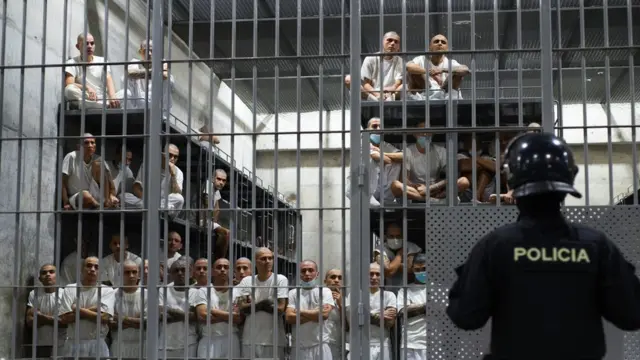US Deports Alleged Gang Members To El Salvador: Bukele’s Gain?
Aligning with its strict stance on immigration, the US administration has been deporting alleged gang members to a prison facility in El Salvador. This seems to align with President Trump’s staunch position on illegal immigration and crime reduction. On the other side of the equation is El Salvador’s leader, Nayib Bukele, who appears to have capitalized on this arrangement, even securing a visit to the White House and an endorsement amid questions about his heavy-handed strategies against civil rights. The specifics of this agreement have not been disclosed, but those in the know suggest it might serve as a template for nations capable of accepting expelled migrants of various ethnicities.
In a noted statement, a spokesperson from the White House exhibited gratitude for Bukele’s collaboration and the use of his high-security prison facility. A probe by The New York Times revealed that the US administration didn’t only reimburse Bukele’s administration roughly $5 million for incarcerating over 200 Venezuelan deportees, but it also conceded to a unique request—extradite to El Salvador a number of top-ranking MS-13 leaders from American custody. Some of these leaders were rumored to hold insights about Bukele’s involvement with the gang.
There is compelling evidence pointing towards covert negotiations between the Salvadoran administration and MS-13 leaders, according to US authorities. Some suggest Bukele might be attempting to conceal these findings. His administration refused to comment when contacted, but Bukele maintains he has no clandestine dealings with the notorious gang.
In April, a noteworthy shift occurred when the State Department elevated El Salvador’s travel warning to the highest level due to a ‘decrease in violent crimes and murders.’ Despite past issues with elevated crime rates and substantial human rights matters, El Salvador appears to have made a significant improvement, elevating it to a higher safety level in the eyes of the US. The progress is striking for a country that had once struggled with rampant violence.
Such strides in safety have placed El Salvador among the safer countries in Latin America. This follows a directive issued in 2022 by Bukele, enabling mass arrests. However, the timing of the US safety rating announcement, coming shortly after deportations to El Salvador, raised skepticism among some observers.
Hundreds of thousands of Salvadoran immigrants are under Temporary Protected Status in the US, which protects them against deportation and allows legal employment. These privileges are only set to last until the start of September. Such allowances serve to strengthen Bukele’s political standing within his country, primarily because remittances from family members residing in the US significantly contribute to the nation’s economy.
In recent times, Bukele’s administration has intensified its control over civil liberties, with actions such as clamping down on public associations and detaining critics. The European Union has voiced condemnation over a recently passed law granting Bukele’s government wide-reaching powers to silence opposition, but the US has kept mum.
Bukele’s collaboration with the US, coupled with the visual impact of chained deportees being incarcerated, has generated much attention. The Salvadoran leader recently clashed on social media with a fashion designer who showcased designs during a Paris show that resembled the clothing of the deportees.
Other countries are considering Bukele’s model of a high-security prison system, marking him as a potential point of reference. One such agreement to emulate his approach has already been reported. However, Bukele’s deal with the US concerning the jailing of deportees has attracted stringent examination.
Many relatives of the jailed Venezuelan deportees are advocating for their release, asserting that the detainees have clean records. The arrangement has attracted immense scrutiny, with Democratic lawmakers demanding clear explanations.
There have been allegations of inhumane treatment from one of the deportees who was repatriated. Despite the strong accusations, Bukele has refuted all of them. He has audaciously stated that he is indifferent to being labelled a ‘dictator’ if it prevents violence that harms Salvadorans.
While many of the deported have no criminal history, the Bukele administration has justified the strong-arm tactic as necessary for national security. The administration suggests that the incarceration of those deported from the US is part of a larger crime deterrent.
Bukele’s fortitude in dealing with gang activity, albeit controversial, has made El Salvador safer than in past years. However, critics argue this does not justify the clampdown on civil liberties and potential human rights abuses.
In the face of brewing criticism and controversy, Bukele remains steadfast in his approach towards crime and immigration. His uncompromising attitude towards safety and security appears to be shaping El Salvador’s international relationships and domestic policies.



